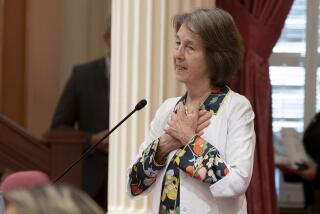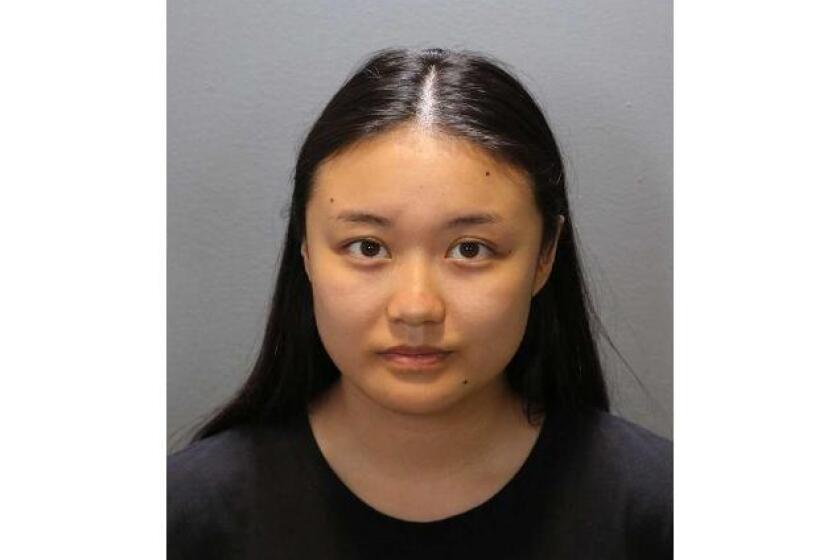U.S. may spare schools from harsh penalties in exchange for reforms
The Obama administration is poised to spare school districts from potentially harsh penalties for low-performing campuses if states agree to broad reforms favored by the federal government, including the linking of teacher evaluations to student test scores.
The plan, outlined by senior administration officials Thursday, would relieve school districts from the requirements of the decade-old No Child Left Behind Act, which requires nearly all students to be academically “proficient” by 2014. Schools that fall short are subject to being shut down, turned over to outside groups or forced to replace their staffs.
“To help states, districts and schools that are ready to move forward with education reform, our administration will provide flexibility from the law in exchange for a real commitment to undertake change,” President Obama said in a statement. “The purpose is not to give states and districts a reprieve from accountability, but rather to unleash energy to improve our schools at the local level.”
The president is expected to make additional remarks on his education initiatives at the White House on Friday.
Under current law, most experts say that nearly every school that receives federal aid would, sooner or later, be deemed a failure, except where individual states dramatically lower academic standards. Congressional action to revise the law — and halt looming penalties for tens of thousands of schools — has stalled as other issues have consumed lawmakers.
Relief would come from a waiver dispensed by the U.S. Department of Education, which is overseen by Education Secretary Arne Duncan. For the administration, the waivers are an opportunity to advance favored reforms without waiting for overdue direction from Congress. This could include freeing some much-needed funding for districts to use at their discretion.
But two provisions for obtaining a waiver are likely to spark debate, particularly in California. One is the push to use student data as part of a teacher’s evaluation. The other is the designation of each state’s lowest-performing 15% of schools for the aggressive, often controversial, measures now in place. That percentage could be substantially higher in the Los Angeles Unified School District, which serves a large number of low-income minority students attending campuses with poor test scores and high dropout rates.
The state’s top education official was unavailable for comment Thursday but has repeatedly objected to pre-conditions for waivers. The Obama administration should not be setting federal education policy on its own, California Supt. of Public Instruction Tom Torlakson has said. He is joined in that view by some members of Congress as well as by some officials from other states.
Torlakson also opposes using data from California’s standardized tests as part of a teacher’s evaluation. In a meeting last week with Times editors and reporters, he said the tests were not designed for that purpose.
California still could qualify for a waiver, however, if it is willing to work toward the administration’s goals, which could be encompassed in the next generation of state tests.
Torlakson’s views align closely with the California Teachers Assn., the major financial backer behind his election. The leadership of United Teachers Los Angeles has strongly opposed using test data in evaluations although some unions elsewhere have allowed test scores to play a role. In California, teacher evaluation methods must be negotiated with bargaining units.
L.A. schools Supt. John Deasy said the federal priorities echo his own.
“It’s a high bar Secretary Duncan has set and I have no problem meeting the bar,” Deasy said. “I will be urging the state to apply for this.”
If the state receives a waiver, L.A. Unified could gain new freedom in how it spends more than $100 million in federal funds annually. Currently, much of that money must go to outside tutoring services at schools failing to meet No Child Left Behind targets. There is little oversight over tutoring vendors and that strategy has yielded few benefits, Deasy said.
Forgoing a waiver, said Deasy, “would be a shame and harmful to districts in desperate fiscal situations who are not afraid of an appropriately balanced accountability system.”
More to Read
Start your day right
Sign up for Essential California for news, features and recommendations from the L.A. Times and beyond in your inbox six days a week.
You may occasionally receive promotional content from the Los Angeles Times.







